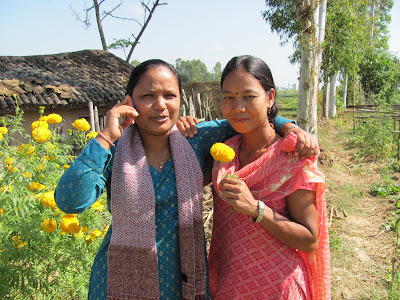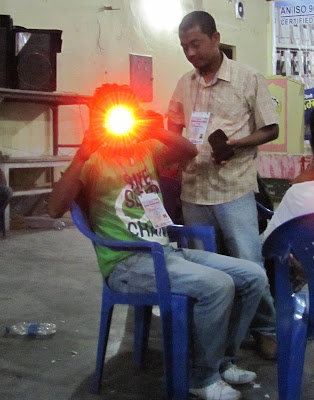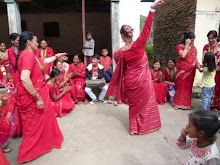Friday, November 19, 2010
Why I love training in Nepal
No training here is complete - or too successful - without lots of breaks for entertainment. This translates to: singing, dancing, poems and/or jokes.
At the beginning of a training only the more outgoing participants tend to volunteer for entertainment (for obvious reasons). By the end of a training, however, usually just about anyone will get up and present something. And at the very end, a good training often feels like a party. Singing, dancing, laughing.
People here know how to have a good time. They know that enjoying and celebrating is part of the work.
This short video was filmed on my recent trip to far Western Nepal, Dang. I led up a team of us who delivered training on "Gender, Leadership, and Micro Finance".
Most of the folks in the training were from the Tharu community, an indigenous group to Nepal. So, there were times when we did double translation. English to Nepali. Nepali to Tharu. Always an opportunity to think creatively here about how to make things really work in development work.
Enjoy...
Tuesday, November 16, 2010
Traditional meets Modern

Above: Lalita (on cell phone) and Lissim, who come from a small village in South Western Nepal.
In Nepal, especially, I constantly witness amazing intersections between traditional and the modern.
Just 10 years ago the goats and chickens in Lissim's village would be attacked regularly by tigers. Now, that particular threat is less probably due to influx of population in the area, as well as poaching. But coming into this village, in many ways (though not needing to be worried about the tigers), I feel like I could have stepped back hundreds of years earlier and things would have otherwise looked just the same way.
Lissim's house was actually built only 20 years ago, with wood, straw, mud, and cow dung. The hand washed laundry is hung to dry on a beautiful, hanging wooden pole. She cooks as her family has always - over a fire in the kitchen on the first floor.
A bit worried about the health risks associated with cooking this way (the smoke inhaled is hard on the lungs) and aware of the work involved with gathering firewood for every fire, I asked if they ever thought of having a gas stoves.
No, she replied. The rice cooked over fire is sweet. Rice cooked over anything else isn't as good.
Her "refrigerator" is a ceramic bowl, a vessel for the milk that comes from the cow she milks every morning. Rice is sifted by a hand-cranked fan that, when cranked hard enough, can separate the rice from it's hull.
Absolutely everything on her piece of land and in her house is organic, natural. Except for a very few items within the house that are immaculately taken care of. A comb, one small mirror, a picture on the wall of she and her brother (who is working in Dubai), and a computer. She proudly shows me video after video of traditional Tharu dances on her computer. I'm not sure that she uses the computer for much else. But her cousin seems quite adept on the computer and is often surfing the net.
While Lissim's house and surroundings are absolutely beautiful, life in the village is difficult. She works hard all day, every day, taking care of all the animals, cooking, planting rice and cultivating. And there is a severe lack of water in this village, which presents not only daily living task challenges, but also health risks.
So some, who have the opportunity (or through necessity), have picked up and moved to towns like where I live, Hetauda, which aren't quite city and aren't quite village, but somewhere in between.
My neighbors, who moved here recently still cook outside every morning and evening on an oven that they have built from mud as they did in their village. But now live in a concrete house with electricity and running water.
I was leaving home the other day to come to work and noticed that they had a new puppy. A black and white dog who was drinking water at the time. I had to fight the urge to go and play with the puppy since I was already late to work. For future reference, however, I wanted to know what the puppy's name was, so I asked.
The answer? Facebook.
Saturday, November 13, 2010
Greeting the Sun

Yesterday my colleague told me as she was running out the door to an evening meeting that something interesting was happening at the river. I had no idea what it was, but have learned that if someone remembers to tell me to see something happening here, it is always really worth seeing.
So I headed down to the bridge. There were thousands of people gathered in something that felt a mixture of ritual and circus atmosphere. In an outer circle marked by makeshift rope and colored flags swarmed masses of people, vendors selling balloons and sweets, an occasional firecracker that I assume was left over from the last festival, Tihar. Hindu chanting music was piped in over a loud speaker.
Closer in towards the river women were gathered surrounding huge circles of their puja objects: fruits, flowers, incense, candles, and sweets. Praying. Many had their best saris on and large gold jewelry: one-piece ornate strings that linked their nose, ear, and forehead. Their children and husbands stood near by, others walking by and occasionally throwing in rice, sweets towards the center of the circle/altar.
The more well off families were placed side-by-side, one after the other, under a brightly-colored, festive-looking material covering. But there were even more people who were doing their puja (ritual) at the river bank, some in the river.
After everyone started to pack up after dark, I was told to return in the morning. These families would also be returning, would re-set up their circles, and pray and wait until the sun rose. Some stayed all night, I believe.
I was told that the ceremony is in honor of the sun...to welcome and honor the sun at the time when the weather is decidedly getting cooler and it is getting dark earlier and earlier.
So I woke up a 5:30 am this morning and headed back to the river, took off my shoes and socks and got into the water, and also waited to greet the sun.
4093, 4101, 4103
Monday, November 8, 2010
I'm staying in today

Photo above: A picture of a stranger taking an unannounced snapshot of me.
A few things that have come into clearer focus about myself during this last year in Nepal. One, change really can be difficult for me and I think I adjust slower to change than some. Second, I am a really sensitive person.
It's Tihar holiday here right now and, by all accounts, my favorite holiday that I've experienced so far in Nepal. It is the festival of lights. Of sweets, cleaning homes, welcoming the goddess Laxmi (goddess of wealth), joy, singing, dancing, honoring the dog, honoring the crow, honoring cows, honoring the connection between sisters and brothers, and of 7-colored tikkas.
My neighborhood which is normally quiet and deserted by 7:30 pm every evening has been alive with candles, constant singing, and fireworks every night the last 3 nights until at least midnight. Everyone seems to be participating and having fun - the children, the women...
This is the stuff I *love*. I've had more invitations than I could count to singing and dancing rounds, puja (rituals) in private homes, new year's celebrations, dinners, and people's village homes. But I haven't accepted any of them. Because honestly, I am still recovering from Deshain (the last holiday).
Many parts of Deshain were fabulous. I got a window into people's lives and communities that few people would ever get to see. But it was also in equal measure a bit traumatizing for me.
Every day I am horrified by the inequalities between women and men here. I put on my best analytical thinking skills and tell myself: it's a different culture and I can't compare. Change happens slowly - and positive change is happening here (which it is). But in my heart, I find the way that most women are treated here (by too many, but not all men), heart-wrenching.
And as I get to know Nepali women better, they share their own personal stories with me and confirm that yes - they feel that being a woman in Nepal is extremely, extremely difficult and too often, crippling.
Despite what I was hoping, I spent all of Deshain only with men, because women are only allowed to cook and clean. Men, however, are allowed to travel and visit whoever they want, and they can gamble and drink away the small amount of money that the family has. Often leaving not enough for their children's school clothes and books.
Now, I always do my best about stereotypes and the misconceptions and hurt that these can cause. There are many exceptions to this scenario. But it is the norm way too often, for way too many families, villages, and communities in Nepal.
I also thought that I could stomach animal slaughter better than it turns out I am able. Because - in theory - I think that it is really amazing to be able to be this close to the food that I eat. To catch the fish that is later on my plate. To see the chicken (happy, running free, well taken care of) right before it is killed. To eat a goat that has been truly loved and honored.
In the West I am so removed from the food I eat, and where it comes from. I usually have no idea how it was treated, what food it ate, how it was killed. And - on an intellectual level - I think it is really a gift to be able to witness the full process of an animal's life, which is then prepared as food that sustains me. I have the opportunity to thank the fish and the chicken for giving up their lives so I can eat and be healthy.
When the fish from my friend's pond showed up on the plate in the kitchen ready for preparation, though - still breathing in slowly, not quite dead - on the inside, I lost it.
I didn't show my horror and fear to my hosts. They were showing me a huge honor by sharing their fish and then later, by serving me the fish head (the part of the fish with the most vitamins).
But I was in absolute horror. I LOVE fish. I LOVE animals. This fish had just been swimming happily around in a nice lake surrounded by rice fields and warmed by the sun. Then it was stuck in a bucket, not quite dead, for too long. And now it was on my plate, given to a person who had been fed so much in the last 3 days she couldn't ever imagine feeling hungry again. I could see everything in it's head - the eyes, the gills...as it had just been chopped off and cooked with no other preparation- left for me to figure out how to eat.
I couldn't do it. I just couldn't. I wasn't even remotely hungry, and I felt too connected to the life of the fish. There was nothing I could do to convince myself that I needed to be respectful to my hosts in this particular moment, it just didn't matter to me all of the sudden.
So I did the only thing I could do. I put it on my friend, Casper's, plate when I was hoping no one was looking. He didn't want it either, but owed me a favor.
I don't know why this experience in particular was so traumatizing for me. It is multi-layered. For one, I was feeling really sad about watching the fish die when - in my opinion - it was completely unnecessary. But I think that I am equally exhausted sometimes by being the perennial guest-of-honor.
It sounds ungrateful to say this. The true generosity of people and what they are willing to share with me and do for me is something I have never experienced before in my life. I have been brought to tears by people's kindness and willingness to share of themselves in such a real, honest, and meaningful way many times. And for those who know me well, I don't cry very easily.
But I'm starting to not like eating meat as much (which is what you give guests), and often the amount of food I am given is more than I can ever eat. So I'm stuck with either a) eating and doing things I don't want to and lying and pretending that I am happy or b) appearing ungrateful and potentially offending my hosts. I almost always usually choose the former, trying to find the perfect time when I can say, without lying, "I LOVE the food, I just am full and can't eat any more now". But it doesn't always work out so easily in reality.
This Tihar holiday, I've decided to give myself a bit of a rest from being the foreigner and the guest. I am giving myself a rest from answering the same 5 questions from every person (no, I am not married and actually, I am very happy with my life just as it is), strangers constantly taking my picture everywhere I go (I know it is only curiosity, but sometimes I feel like a zoo animal), and from trying to eat too much food so that I can make my hosts happy.
I am watching all the singing and dancing in the neighborhood from my balcony, cup of tea with herbs from home, potatoes and eggs on the burner inside, music from my laptop keeping me company. And I am happy. Contemplating, recovering, resting up, preparing.
I can enjoy Tihar on the streets and villages next year....
Wednesday, November 3, 2010
Deshain:
Subscribe to:
Posts (Atom)












